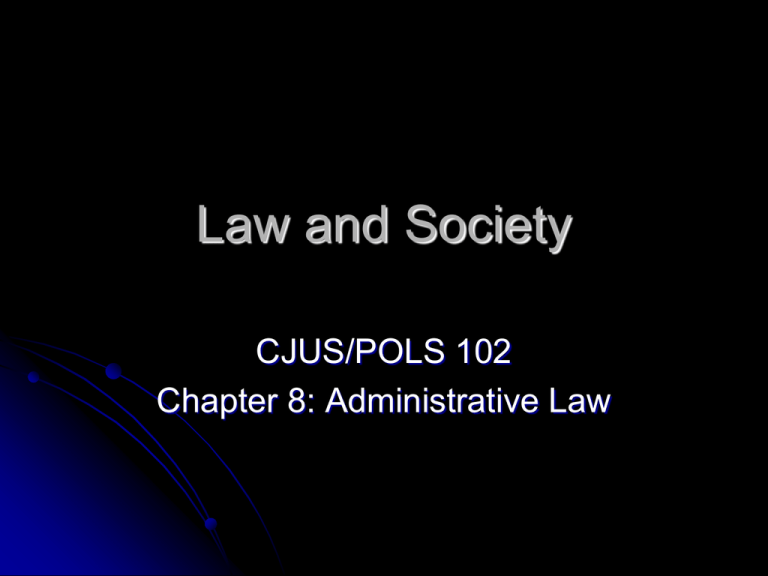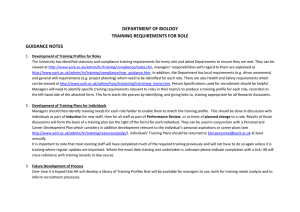Law and Society CJUS/POLS 102 Chapter 8: Administrative Law
advertisement

Law and Society CJUS/POLS 102 Chapter 8: Administrative Law Administrative Law 1. Bureaucratic organizations - tremendous growth - number and power a. Political / legal fact of life - immune from forces that could weaken (1) Reagan / Bush (late 1980s) - deregulate US economy - shift governmental power - national to state Admin (a) Congress did not support - states did not support (b) Agencies continued growth - became independent b. Legislative branches - delegate power - volume of government services required - empowered by Congress’ - legislative / executive / judicial powers Admin (1) Delegated necessary powers - make rules - administer / enforce rules - investigate / prosecute violations (a) Reason for increased growth - need and efficiency c. Administrative law - encompasses rules / regulations - under which agencies operate Admin (1) Defines rights / responsibilities - all who seek to challenge - agency’s actions / inaction (2) Administrative Procedures Act - answers questions that may arise (3) Allows agencies to govern / control - wide variety of activities (a) Nuclear weapons to cable television Admin (b) Licensing medical professionals to workplace safety (4) Administrative law - sets forth / limits what agency can do (5) Efficiency - primarily due to people appointed to run them - professionals - political appointees Admin d. Control of bureaucratic agencies - three branches of government - oversee / influence / prohibit (1) Executive - appoint agency officials - remove under some circumstances - appointed for certain term (2) Legislative - conduct oversight hearings Admin - write / rewrite legislation - approve budgets (3) Judicial - enforce legal requirements - hear appeals of decisions e. Functions / process of bureaucratic agencies (1) Licensing - control certain activities Admin - application process (2) Administrative investigations - conducted to gather information - insure compliance - rules / regulations (3) Administrative hearings / adjudication - determine issues brought before them - ruling by a hearing officer (administrative law judge) Admin 2. Administrative rule making - use different procedures to insure control - follow different rules to establish authority - agency has the authority - follow statutory procedures a. To establish policy - relied on their authority - ability to implement / interpret / proscribe (prohibit / forbid / require) Admin (1) Administrative Rule - apply to a class of persons / entities - (FAA) pilots / aircraft / airports - (SEC) stockbrokers / stock market / brokerage houses - (FCC) frequencies / transmitters - (FDA) food / drug / pharmacies / manufacturers (a) “Adjudicative order” - another type of agency action Admin - directed to individual or business - specific individual / representative (2) Legislative rule - most important rule - “force and effect” of law (a) Grant of ‘quasi-legislative power’ - granted by Congress (b) Binding on individual / government Admin - can change by court on appeal - rescinded by the agency (3) General statement of policy - indication of how agency intends to use lawmaking power in the future - does not bind anyone / anything (4) Interpretive Rule - how agency views what a law already in existence requires Admin (5) Procedural Rule - can be issued without prior notice - sets forth guideline to follow b. Licensing - most agencies given authority to license - issue to individuals / businesses - regulatory tool to control activities - “License” / “permit” / “certificate”
